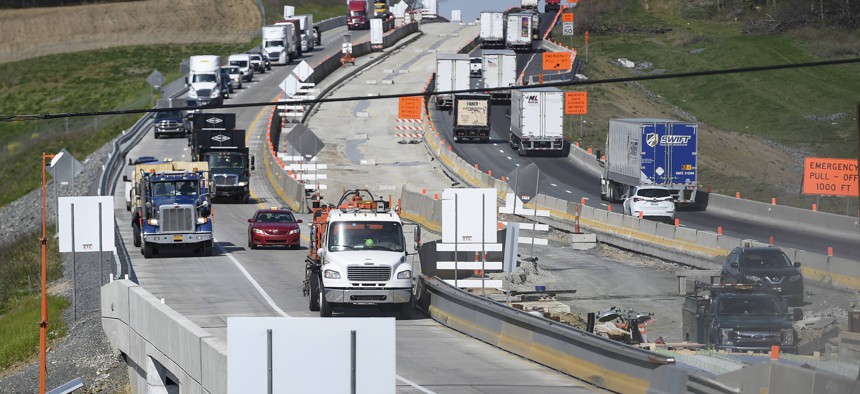Infrastructure Week Finally Yields Actual Infrastructure Projects

Traffic on interstate 78 in Pennsylvania in a work zone. Ben Hasty / MediaNews Group/Reading Eagle via Getty Images
Inflation and workforce shortages are causing difficulties. Still, local officials and the Biden administration are touting progress.
Local leaders greeted the arrival of Infrastructure Week in Washington on Monday with plenty of praise and plans for spending their share of the $1.2 trillion included in a six-month-old federal public works package.
But while local officials remain upbeat about the package, troubles with rising material costs, disrupted supply chains and workforce shortages threaten to hinder projects—at least in the near-term. And while getting the law passed with bipartisan support was a major win for President Biden, recent polling indicates that Americans are more concerned about other issues, especially inflation.
“We appreciate President Biden and his administration for taking all of this seriously, because this has been a crumbling mess for the United States of America,” said Vince Williams, the mayor of Union City, Georgia, and the president of the National League of Cities. “We shouldn’t even [need to] be here.”
Williams told reporters he hopes his city of about 20,000 people near Atlanta would be able to improve its transit connections, which, among other things, would help residents get to jobs at Hartsfield-Jackson Atlanta International Airport.
New Orleans Mayor LaToya Cantrell said city officials there are evaluating some 400 potential projects that could qualify for funding from the Infrastructure Investment and Jobs Act.
Along with traditional public works projects, the new law would also make it possible to “address environmental injustice that has plagued our communities for decades,” Cantrell said, citing the possibility of turning a landfill in her city into a solar farm as a way to bring jobs to long-neglected areas.
The glowing reviews from local officials come after years of frustration with Washington for failing to tackle infrastructure improvements. A long-running lobbying event called “infrastructure week” became a punchline on Capitol Hill, especially after former President Donald Trump repeatedly undermined his own proposals with partisan attacks.
Biden clearly relished his ability to get an infrastructure law passed with bipartisan support.
“Finally,” Biden said, after the U.S. House sent him the bill in November, “infrastructure week!”
A half a year later, with the legislative victory an increasingly distant memory, the Biden administration touted the progress already being made because of the law.
Mitch Landrieu, the administration’s point person on the infrastructure law, said the administration has already announced plans for $110 billion of funding from the law. Work on some 4,300 projects that are being paid for with the new money is also underway, according to Landrieu, a former New Orleans mayor.
The administration also rolled out a website showcasing projects the law is paying for (particularly airports and waterways) and how the money has been divvied up among the states.
It’s unclear how much the developments will register with the public, though. Only 30% of Americans identified the poor condition of U.S. infrastructure as a “very big problem,” according to a recent poll by the Pew Research Center, putting it near the bottom of their list of concerns. Nearly half of the respondents, though, said it was a “moderately big problem.”
The top concern of Americans, by far, is inflation, according to the poll. Seventy percent of Americans said it was a “very big problem.”
Indeed, runaway costs could limit the impact that the infrastructure law has, too.
Cantrell, the current New Orleans mayor, said it was part of a “trifecta” of problems that was hampering local infrastructure efforts, along with difficulties finding workers and delays caused by supply chain snags.
Some requests for proposals have come back with one or no bidders, she said, or the prices they are submitting are substantially higher than agency officials planned on.
“It is having a tremendous effect locally,” she said of the challenges the city is encountering with projects. “It is a reality, something that we’re working through, and something that the Biden administration understands and sees firsthand.”
Daniel C. Vock is a senior reporter for Route Fifty based in Washington, D.C.
NEXT STORY: Biden Administration Releases $45B for Broadband to States






